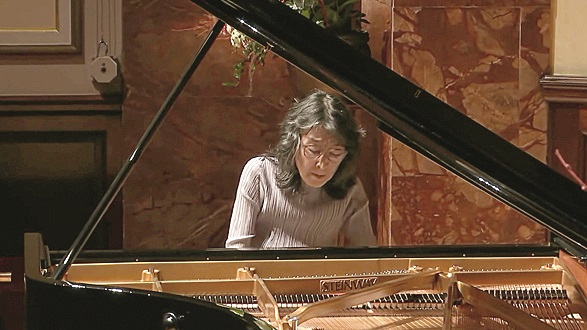Mitsuko Uchida, one of the greatest living interpreters of Franz Schubert, has played his piano sonatas in public for over 50 years. She believes that Schubert’s music “is between life and death; he dreams, with his eyes on the far horizon”. In her words, she will “never be done with Schubert... the great composers always change. And as you change, they change. Especially with the Schubert sonatas, I discovered that I truly have changed”. Her recordings from even two decades ago bear testimony to this; they give one a glimpse into how her interpretations have evolved. Twenty years ago, Uchida was emotionally direct, with the music highlighted in the boldest font; now, at the age of 72, her playing has taken on a self-reflective, inward quality, as though her listeners are hearing it in a dream.
This was the introspective atmosphere Uchida seemed to create when she performed at the Wigmore Hall recently in a live-streamed concert. Her reading of two of Schubert’s late masterpieces was so intimate at times that watching it on a screen felt almost voyeuristic. She first played the Piano Sonata in C Major, D. 840, named Reliquie upon posthumous publication owing to the mistaken assumption that it was Schubert’s last piano sonata.
The first movement crept in, with richly-contrasting themes seeping in and out, sometimes simply vanishing or meandering into wholly new harmonic landscapes. This was followed by a melodic, almost melancholy andante in the parallel minor key — a movement that is singular among all of Schubert’s compositions for its vast array of ideas and characters. Uchida, unsurprisingly, was in her element, creating minuscule, sublime moments of filigreed beauty.
The deeply contemplative Piano Sonata in G Major, D. 894 was published in 1827 under the name Fantasy because the publisher was reluctant to accept Schubert’s idea of a sonata. Indeed, the piece is rooted in improvisation, rarely adhering a strict, sonata-like musical structure. But Uchida’s understanding of the architecture and language of Schubert’s work is remarkable; few can map the wild terrain of his mind like she can. It is one thing to get the notes of the Fantasy right; it is quite another to play the thoughts within them, their light, darkness, the silence at the conclusion of a phrase. Uchida did all of that. The composer’s soul was very much alive in her touch.










